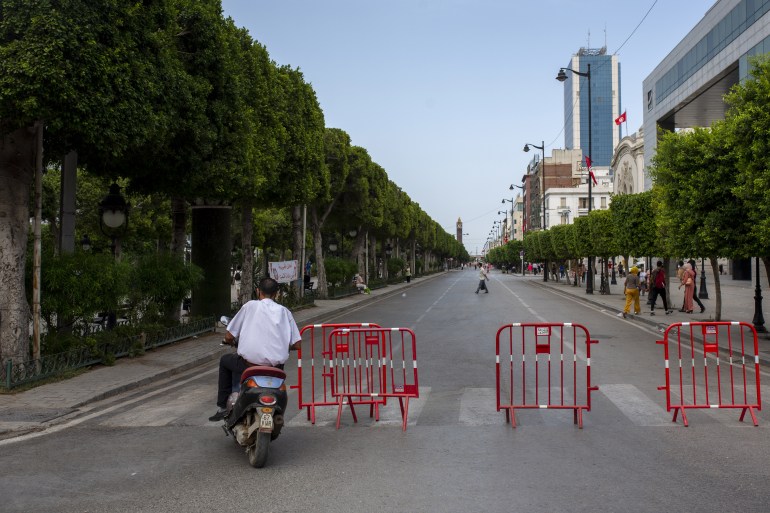Tunisian President Kais Saied said that there is no going back and no dialogue except with those he described as "honest", in reference to his refusal to dialogue with his opponents who criticized his decisions to seize the executive authority and freeze parliament, and some described them as a coup.
Said's statement comes after Ennahda's Shura Council called on Thursday to launch a national dialogue to move forward with political and economic reforms and end the suspension of Parliament's competencies, with the movement carrying out the necessary reviews and renewing its programs.
But Saeed said in a video clip published by the presidency on Thursday, in response to calls for talks on the crisis, "there is no dialogue except with the honest and steadfast who have internalized the demands of the Tunisian people," and it is not possible to dialogue with what he described as "cancer cells."
Saeed pledged not to prejudice rights and freedoms, and said, "No one has been arrested in the country for his opinion."
On July 25, Tunisian President Kais Saied took exceptional measures that suspended Parliament for a period of 30 days, relieved Hisham Al-Mashishi of his duties and assumed executive power, and made appointments to senior state officials.
And after about two weeks of the sudden step, Saeed has not yet appointed a new prime minister, and he has not announced any steps to end the state of emergency or a plan for the coming period.
For his part, the advisor to the Tunisian presidency, Walid Al-Hajjam, said that no final decision has been taken regarding the new prime minister, but steps are being taken in this direction, as he put it.
A police car and an army vehicle block the side entrance to the Tunisian Parliament, following the decisions of President Kais Saied (European News Agency)
In a related context, Tunisian President Kais Saied issued, on Thursday, presidential orders to relieve Akram Al-Sebri of his duties as governor of Monastir, Habib Chouat for the province of Medenine, and Saleh Matrawi for the state of Zaghouan.
The appearance of the walker
The ousted Prime Minister Hisham Al-Meshishi appeared in public yesterday, Thursday, for the first time since his dismissal.
As he appeared in photos published by the Anti-Corruption Authority, which it said were taken Thursday in its office, while he was declaring his properties.
After his dismissal, Al-Mashishi disappeared from view, amid talk of his being placed under house arrest, being attacked in the presidential palace, and detained for some time.
In a related context, the powerful Labor Confederation, as well as the United States and France, called on President Kais Saied to expedite the appointment of a new government.
The Labor Union is preparing a roadmap to end the crisis, and says it will present it to Saeed at an unspecified time.
On Wednesday, the Secretary-General of the Tunisian Labor Union, Noureddine Tabboubi, warned of the dangers of a government vacuum and disruption of government institutions in the country, stressing keenness on the approach of dialogue with all parties.
The union also called in a statement, "to expedite the appointment of the head of a mini and harmonious rescue government that will have specific, urgent and exceptional tasks and meet the social benefits of providing jobs and fighting poverty and marginalization, and ably confronting the Covid-19 pandemic."
On the other hand, Chairman of the US Senate Foreign Relations Committee Bob Menendez and prominent member of the Senate Jim Risch said Thursday that they are "deeply concerned" about the increasing tension and unrest in Tunisia.
And they added in a joint statement, "President (Kais) Said must return to commitment to the democratic principles that support US-Tunisian relations, and the army must abide by its role within the framework of a constitutional democracy."
organizations statement
For its part, 7 Tunisian organizations and unions signed a statement calling for the speedy formation of a government of qualified people, and the development of a road map for a way out of the current crisis.
In a joint statement, the organizations called on President Kais Saied to develop a plan of action according to a clear and specific agenda in a participatory manner with civil forces, and stressed the need to respect the principle of separation of powers and the independence of the judiciary and its survival as an independent authority.
The Tunisian street awaits the formation of a new government and a road map for the next stage, following Said's exceptional measures (Anatolia)
Civil society organizations also stressed the need to form a government as soon as possible in which efficiency and parity are respected, and expressed their condemnation of the interference of foreign capitals in Tunisian internal affairs and state sovereignty, and called for the formation of a committee to investigate corruption since 2011.
The statement was signed by the National Syndicate of Tunisian Journalists, the Association of Tunisian Judges, the Tunisian Association of Young Lawyers, the Tunisian Association of Democratic Women and other organizations.
In addition to the political crisis, Tunisia is facing a deteriorating health situation with the exacerbation of the Covid-19 epidemic, which has killed more than 20,000 people.
The country has also faced a severe economic crisis for years, deepened by political quarrels and disagreements between Saeed and the parties.
Saied, who was elected in 2019 with more than 70% of the vote, is widely popular and his exceptional decisions have been welcomed by many Tunisians.

